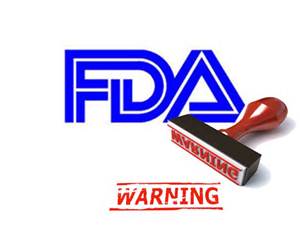FDA Is Diving Deeper in GMP Compliance for Compounding Pharmacies – A Follow-up
Warning Letters and significant FDA 483 observations continue to confront the compounding pharmacy space. (See previous post here: http://www.lachmanconsultants.com/2015/08/compounding-pharmacies-is-anyone-in-compliance.) With over 40% of compounders inspected receiving Warning Letters and nearly 100% receiving critical observations, can this industry respond effectively and meet FDA expectations? To date, none of the Warning Letters posted by FDA on their website have been lifted and several larger firms are receiving follow up inspections at a number of their sites. FDA is also determining whether the corrective actions promised at one location are being driven at all at the compounders other locations.
The Drug Quality and Security Act (DQSA), issued in December 2013, defines the compliance requirements for 503A Classical Compounders and 503B outsourcing facilities (DQSA calls for the Secretary of HHS to promulgate GMP regulations, but only a draft guidance has been issued as of yet). Until the Secretary issues the final GMP regulations for 503B Compounding Pharmacies, which will likely mimic drug GMPs, especially in sterility assurance controls, the FDA will continue to enforce 21 CFR 210 and 211 GMPs for drug manufacturing at the compounding pharmacies.
Here is something not to try: A firm, registered as a 503B outsourcing facility, argued in their original response to an FDA 483 in 2014 and in a subsequent February 2015 update to FDA that they were not manufacturing drugs and that they were in compliance with USP <797> and exempt from GMP requirements in section 501(a)(2)(B) of the FDCA.
Fifteen months after the FDA 483, they received a Warning Letter (here) that among a host of violations included the following:
“You stated that you do not engage in drug manufacturing and reference your purported compliance with United States Pharmacopeia (USP)-National Formulary (NF) General Chapter <797> Pharmaceutical Compounding – Sterile Preparations. You also reference the exemption under section 503A of the FDCA from CGMP requirements in section 501(a)(2)(B). However, in your most recent response, you state that you intend to adhere to CGMP requirements for finished drug products established in 21 CFR parts 210 and 211.
As noted above, your firm registered as an outsourcing facility under section 503B of the FDCA. Section 503B does not provide an exemption from section 501(a)(2)(B) of the FDCA. Outsourcing facilities are subject to CGMP requirements under section 501(a)(2)(B) of the FDCA.”
The Warning Letter included many of the top ten violations (see below) cited in FDA 483s issued to compounding pharmacies along with citations to the firm for manufacturing unapproved products.
Also FDA is diving deeper on follow up inspections of other compounding pharmacies. A recent FDA 483 (see July 10, 2015 FDA 483 (here) cited the firm for lack of stability data to support beyond use dating. Many firms have no or only data on one lot of compounded sterile products (CSPs) and few have validated and/or stability indicating analytical methods.
We are now seeing FDA dive deeply and issue observations akin to drug manufacturers such as analytical methods not being validated or not stability indicating and analytical methods that do not determine impurities and degradation products in CSPs.
The industry is continuing to conduct numerous recalls due to lack of sterility assurance, labeling errors, compounding errors (sub- and super-potent, wrong, or unapproved ingredients), and for compounding of unapproved products. Several compounding firms have shut their doors and several injunctions have been filed against individuals and firms in this industry.
The following are the Top Ten most frequently cited adverse observations from FDA:
Top Ten – All affect Sterility Assurance and are cited greater than 60% of the time in inspections:
Inadequate facilities designs and controls, inadequate smoke studies
- Inadequate or lack of environmental monitoring of facility and people
- Inadequate laboratory procedures and controls (definition of a “batch”, sampling and testing controls)
- Lack of Standard Operating Procedures to prevent microbial contamination
- Inadequate deviation/variance controls and lack of adequate investigation
- Stability program nonexistent or does not support beyond use dating
- Validation of final sterilization (filter or terminal), media fill design
- Inadequate cleaning and disinfecting programs
- Batch release (most done at risk or with no testing for sterility, potency, identity, and pyrogens)
- Control of equipment (preventive maintenance and calibration program inadequate or nonexistent)
The top ten are now followed by: Lack of validated analytical methods for stability and potency testing, lack of analytical methods for determining impurities and extraneous peaks in chromatography, personnel qualifications, training and skill maintenance, no segregation of beta lactams for other preparations, ineffective quality unit, labeling matters, personnel not trained in GMPS, change control, incoming supplies acquisition and approval, inadequate raw material controls, inadequate separation of operations, record keeping, and inadequate SOPs for operations,
Why is the Industry struggling to meet FDA requirements and expectations? It may be due to the lack of experience and knowledge in the FDA-regulated world of the Food and Drug Cosmetic Act by the Compounding Industry.
It does not appear that the compounding pharmacy industry is meeting FDA expectations for compliance to 21 CFR 210 and 211 and the Industry Sector is not developing sound scientifically-based corrective action plans to resolve FDA 483 observations and Warning Letters. Many firms appear to lack the knowledge of the drug GMPs and how to develop robust quality systems and controls for compliance.
What can they do? Arm the firm with knowledge of drug manufacturing and hire the right people that understand how to convert that knowledge to wisdom to come into compliance with the FDCA.



